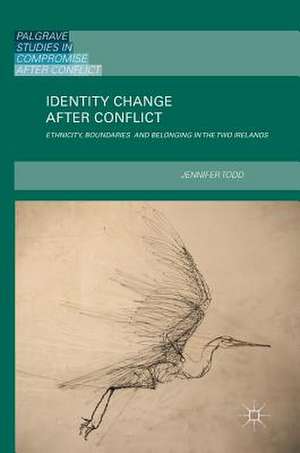Identity Change after Conflict: Ethnicity, Boundaries and Belonging in the Two Irelands: Palgrave Studies in Compromise after Conflict
Autor Jennifer Todden Limba Engleză Hardback – 5 dec 2018
| Toate formatele și edițiile | Preț | Express |
|---|---|---|
| Paperback (1) | 581.79 lei 6-8 săpt. | |
| Springer International Publishing – 21 feb 2020 | 581.79 lei 6-8 săpt. | |
| Hardback (1) | 591.79 lei 6-8 săpt. | |
| Springer International Publishing – 5 dec 2018 | 591.79 lei 6-8 săpt. |
Din seria Palgrave Studies in Compromise after Conflict
- 18%
 Preț: 727.80 lei
Preț: 727.80 lei -
 Preț: 332.14 lei
Preț: 332.14 lei -
 Preț: 380.63 lei
Preț: 380.63 lei -
 Preț: 387.75 lei
Preț: 387.75 lei - 15%
 Preț: 642.03 lei
Preț: 642.03 lei -
 Preț: 387.20 lei
Preț: 387.20 lei - 15%
 Preț: 640.06 lei
Preț: 640.06 lei - 18%
 Preț: 953.20 lei
Preț: 953.20 lei - 18%
 Preț: 783.50 lei
Preț: 783.50 lei - 18%
 Preț: 730.35 lei
Preț: 730.35 lei - 18%
 Preț: 730.65 lei
Preț: 730.65 lei - 18%
 Preț: 789.83 lei
Preț: 789.83 lei - 15%
 Preț: 527.79 lei
Preț: 527.79 lei - 15%
 Preț: 697.15 lei
Preț: 697.15 lei - 15%
 Preț: 528.13 lei
Preț: 528.13 lei - 15%
 Preț: 582.63 lei
Preț: 582.63 lei - 5%
 Preț: 1286.08 lei
Preț: 1286.08 lei - 15%
 Preț: 636.63 lei
Preț: 636.63 lei - 18%
 Preț: 783.50 lei
Preț: 783.50 lei - 15%
 Preț: 640.06 lei
Preț: 640.06 lei - 18%
 Preț: 725.61 lei
Preț: 725.61 lei -
 Preț: 319.81 lei
Preț: 319.81 lei - 15%
 Preț: 640.06 lei
Preț: 640.06 lei
Preț: 591.79 lei
Preț vechi: 696.22 lei
-15% Nou
Puncte Express: 888
Preț estimativ în valută:
113.24€ • 118.23$ • 93.72£
113.24€ • 118.23$ • 93.72£
Carte tipărită la comandă
Livrare economică 04-18 aprilie
Preluare comenzi: 021 569.72.76
Specificații
ISBN-13: 9783319985022
ISBN-10: 3319985027
Pagini: 271
Ilustrații: XVII, 279 p. 8 illus., 2 illus. in color.
Dimensiuni: 148 x 210 x 24 mm
Greutate: 0.64 kg
Ediția:1st ed. 2018
Editura: Springer International Publishing
Colecția Palgrave Macmillan
Seria Palgrave Studies in Compromise after Conflict
Locul publicării:Cham, Switzerland
ISBN-10: 3319985027
Pagini: 271
Ilustrații: XVII, 279 p. 8 illus., 2 illus. in color.
Dimensiuni: 148 x 210 x 24 mm
Greutate: 0.64 kg
Ediția:1st ed. 2018
Editura: Springer International Publishing
Colecția Palgrave Macmillan
Seria Palgrave Studies in Compromise after Conflict
Locul publicării:Cham, Switzerland
Cuprins
1. Reflexivity and group identity in divided societies.- 2. Understanding identity change: conditions, context, concepts.- 3. Ethnic divisions? Types of boundaries and the temporality of change in Northern Ireland and the Republic of Ireland.- 4. The grammar of nationality, the limits of variation and the practice of exclusion in the two Irelands.- 5. Distancing from division: The frequency and framing of individual identity innovation.- 6. How people change: cultural logics and social patterns of identity change.- 7. Situated cosmopolitans: mixed marriage individuals and the obstacles to identity change.- 8. Modes, mechanisms, types and traps of identity change: comparative and explanatory tools.- 9. Identity politics and social movements: flags, same sex marriage and Brexit.- 10: Conclusion.- Appendix: Methodological appendix.
Recenzii
“It remains unclear how this ethic can apply to politicians whose raison d’être depends on ethnic boundary making and who strike fear rather than safety into both in- and out-group members. In some ways, the question is out with the rationale for the book, but having identified the ways that change can occur, a follow-up might be to explore how change can be cultivated. Todd’s book is an indispensable guide to that question and ought to be read by students of identity change.” (Cillian McGrattan, Journal of British Studies, May 12, 2020)
“This book is a profound contribution to our knowledge of identity innovation across the island of Ireland and more broadly. It is an excellent example of how ambitious data collection and deep research can develop theories that provide convincing accounts of complex social phenomena and provide the basis for generalisation.” (Dawn Walsh, Irish Political Studies, April 11, 2019)
“This book is a profound contribution to our knowledge of identity innovation across the island of Ireland and more broadly. It is an excellent example of how ambitious data collection and deep research can develop theories that provide convincing accounts of complex social phenomena and provide the basis for generalisation.” (Dawn Walsh, Irish Political Studies, April 11, 2019)
Notă biografică
Jennifer Todd is Professor in the School of Politics and International Relations, University College Dublin; Member of the Royal Irish Academy; Research Director, Institute for British Irish Studies, UCD; Fernand Braudel Senior Fellow, European University Institute, Florence (2016); Fellow of Geary Institute UCD, (2016-); and Fellow, Political Studies Association of Ireland (2017-9).
Textul de pe ultima copertă
This book explores everyday identity change and its role in transforming ethnic, national and religious divisions. It uses very extensive interviews in post-conflict Northern Ireland and the Republic of Ireland in the early 21st century to compare the extent and the micro-level cultural logics of identity change. It widens comparisons to the Gard in France, and uses multiple methods to reconstruct the impact of identity innovation on social and political outcomes in the 2010s. It shows the irreducible causal importance of identity change for wider compromise after conflict. It speaks to those interested in Cultural Sociology, Politics, Conflict and Peace Studies, Nationalism, Religion, International Relations and European and Irish Studies.
Caracteristici
Examines how and why people shift their sense of identity in divided societies and in post-conflict contexts Offers a socially-contextualized comparative and empirical analysis of Northern Ireland and the Republic of Ireland Challenges other research and assumptions about the impermeability of boundaries and the polarising effects of violent conflict Presents a typology of identity change which shows the obstacles specific to each type of change Discusses policy implications
